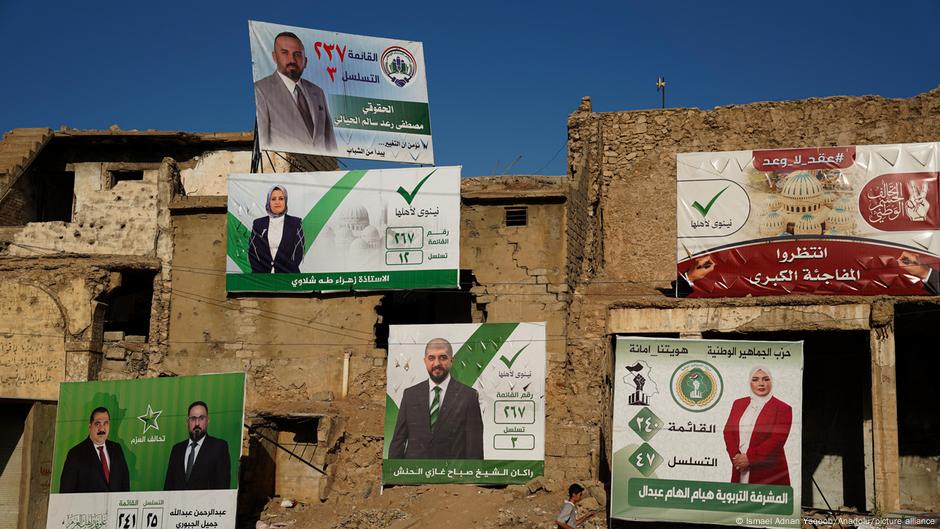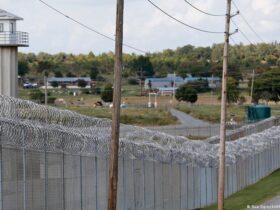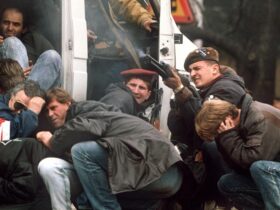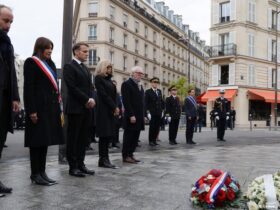“Iraq is the best country I’ve ever been to,” says Khudair al-Ali, a young man who works for one of Iraq’s oil companies but drives for Careem, the Middle East’s version of Uber, on weekends.
“But we still have problems,” he says, pointing to the potholes he is trying to avoid. “The roads need to be fixed and there are too many cars in Baghdad.
“We need more bike lanes,” he says enthusiastically before explaining how it only takes him 15 minutes to bike to work, but more than an hour to drive.
The lack of bike lanes was once the least of Iraq’s problems. The country has often been in the news for war and violence. But in the past few years, much has changed: Iraq is seeing its longest period of stability since the US invasion more than 20 years ago.
Recent Gallup polling shows that Iraqis’ trust in political and national institutions is at a record high, with 55% expressing confidence in the government – unusual in the Middle East, where only Iranians and Jordanians are better pleased with their leaders. Surveys show that local people’s trust in institutions such as the police, military and judicial system is also at an all-time high.
A different Iraq emerges
“The Iraq of today is not the same as the Iraq of 20 years ago or even five years ago,” said Mohammed al-Hassan, head of the United Nations Assistance Mission for Iraq. Recently told the United Nations Security CouncilBarriers remain, al-Hassan said, but “Iraq is more secure, stable and open today.”
“The overall security and prosperity trends are positive,” said John Wilkes, Britain’s former ambassador to Iraq. Wrote for the Atlantic Council in early September After returning from Iraq. “Even if widespread corruption continues to act as a brake on progress.”
“Corruption is still the same as it was before,” confirmed Mustafa Hussein, a civil servant, over lunch at an upscale restaurant in Baghdad. “But things are really coming through. The other day I had to register my car for a new license plate and I did it online. Later two people came to my house to put the license plate. They actually came to my house,” he exclaims. “Wonderful!”
“Same thing for passports,” agreed journalist Ibrahim Ayash during his lunch break. “Things are working better here now.”
All this has made both men more eager to vote in Iraq’s upcoming elections on November 11, when Iraqis will elect a new 329-seat parliament.
“The last time I voted was in 2005,” Hussain said.
That election, 20 years ago, was the first time Iraqis had been able to vote since dictator Saddam Hussein was ousted from power as a result of the 2003 US invasion of the country.
Haddad, who had not voted since 2005, argued, “Nothing ever changed. But this time I will vote – because of this man,” he told DW, referring to Iraqi Prime Minister Mohammed Shia al-Sudani, who is in power through 2022.
Many Iraqis view al-Sudani as an astute technocrat who is able to balance competing interests in Iraqi politics. They also hold him responsible for improving state services and many infrastructure investments.
impact on elections
So how will all the construction, peace and positivity translate into the upcoming elections and perhaps more importantly, voter turnout?
In 2005, voter turnout was a whopping 80%, but has declined since then, as Iraqis become increasingly disillusioned. In the previous elections in 2021, turnout was so low that the results became almost irrelevant.
“Many Iraqis look at what’s happening in Baghdad – with development, building, infrastructure and what’s happening elsewhere in the region, with all these conflicts in Syria, Lebanon, Yemen, Iran, Palestine – and they’re saying that, for once, we seem relatively stable,” says Renad Mansour, director of the Iraq Initiative at the British think tank Chatham House. “So there is a sense of relief. But after two decades of voting, they also know that even if al-Sudaini, or whoever they vote for, actually wins, it is not their vote that determines who will be the next government.”
Mansour argues that elections in Iraq are less a referendum on local politicians and more “a way for elites to come back to the table every four years and renegotiate their position and stake in the state”.
Since the end of the dictatorship, the most powerful positions in Iraq’s government have been negotiated to ensure that every major demographic has a role. For example, the Iraqi Prime Minister is always Shia, the Speaker of Parliament Sunni, and the President Kurdish. The system was originally organized this way to avoid fighting between different groups. But this has since become a hindrance, giving the impression that the same powers remain in charge.
“Seats won in elections will serve as bargaining chips that elites will deploy with other levers of power – including violence and street mobilization – as parties compete for senior government positions,” Mansour explained. An October primer on the ballot.
It then takes months of negotiations to form an Iraqi government and leaders are not elected directly by voters but during negotiations. So even if al-Sudani manages to emerge victorious, he cannot be re-elected as prime minister.
Voters in Iraq ‘deeply disappointed’
“The fact that we have some stability doesn’t necessarily make people want to vote,” explains Sajjad Ziad, a Baghdad-based political analyst and fellow at the think tank Century International.
“Look at the polling,” he told DW. “This Prime Minister has high approval, probably the highest of any Prime Minister going into the election. But does that mean those people are going to vote for him on the day? Will they actually show up?”
Ziad says most ordinary Iraqis he talks to tell him they will not vote in November.
“Who are the people I’ve talked to [going to vote] Police officers are civil servants – basically people who identify with their candidate or who benefit from the system. “While the vast majority is loyal to no one and does not see elections as a medium for change.”
This is supported by voting inside Iraq.
“Recent surveys show that people have become deeply disillusioned with the ballot box as a means of accountability,” said Munkith Dagher, head of the Al Mustaqila Group for Research in Iraq, which regularly surveys popular sentiments about elections. Written in early October“If current trends continue, turnout in 2025 could be the lowest in Iraq’s history since 2003.”
And this could be a serious problem for Iraq’s relative stability, he argued: “Turnout is not just a statistic – it is the foundation of electoral legitimacy. Iraq’s post-2003 political system rests on the premise that popular participation can translate into conflict at the ballot box. Every decline in turnout erodes that fragile foundation.”
Edited by: Carla Bleiker






Leave a Reply